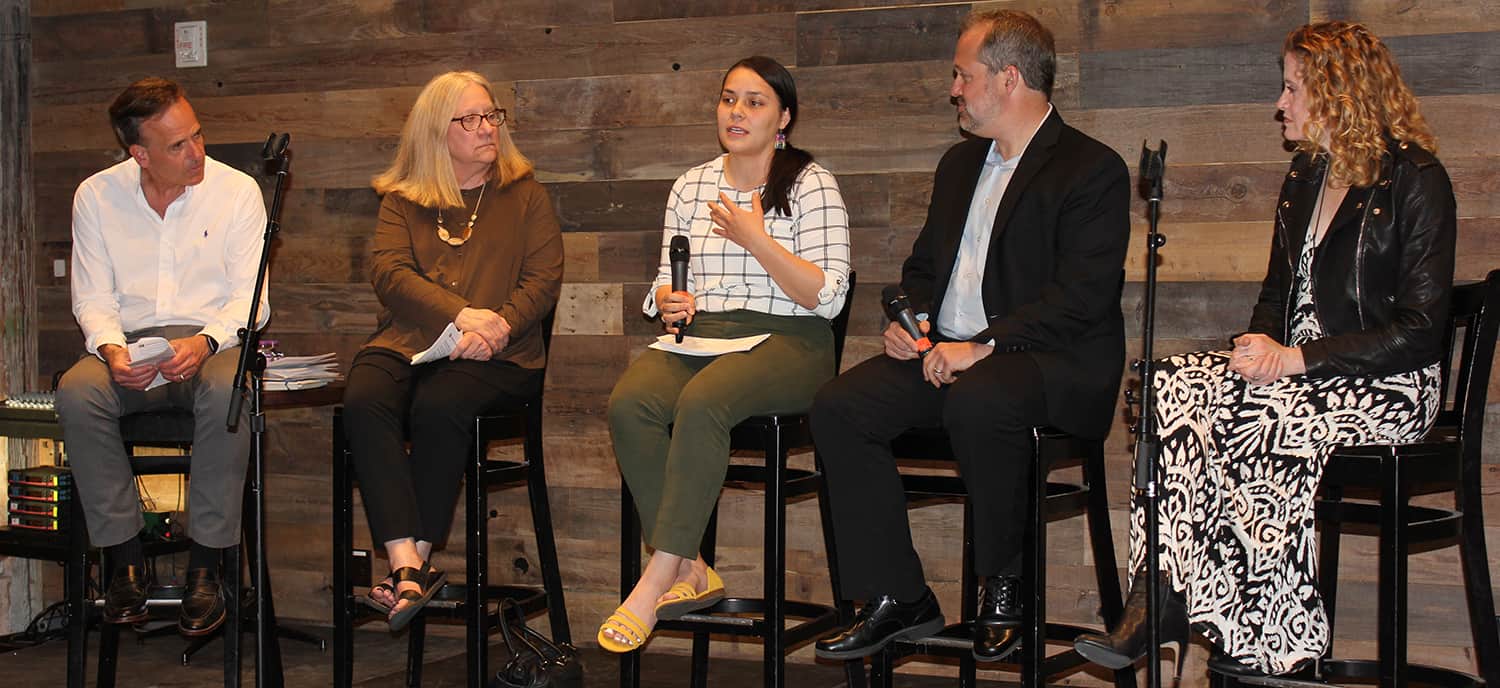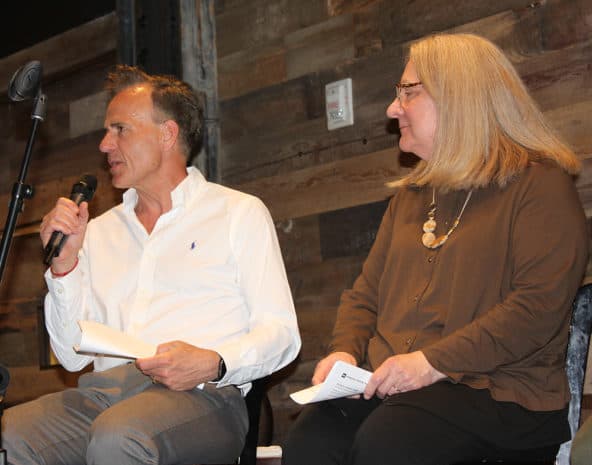Reflecting on “Voicing the Unspoken Struggle”

Ken Barlow, meteorologist, Sue Abderholden, NAMI executive director; Payton Counts with the youth program at the Indigenous Peoples Task Force; Fraser director of mental health Aric Jensen, and Dear Evan Hansen cast member Christiane Noll
A variety of reasons brought people to “Voicing the Unspoken Struggle,” a community conversation inspired by the mental health theme in Dear Evan Hansen, the hit Broadway show that visited Minneapolis, and hosted by Hennepin Theatre Trust.
For moderator Ken Barlow, it was an opportunity to deliver his plea to avoid feeling shame over a mental health disorder diagnosis.
“I was so ashamed,” Barlow told the crowd of people at the Trust’s event center. “Don’t be ashamed like I was. I found out my father had been diagnosed and kept it a secret, so I thought that’s what you did. After going through the five stages of grief, I hope I can help others by sharing my story.”
Barlow, a meteorologist for KSTP-TV, has become an outspoken advocate for mental health conversations since going public with his diagnosis of bipolar disorder in 2012, five years after receiving the diagnosis.
He answered crowd questions at the community conversation about the issues of social anxiety, depression and suicide as they’re portrayed in the Tony Award-winning Dear Evan Hansen. The Trust partnered with Fraser Minnesota to host the event, aimed at connecting people to resources and fostering conversation.
Barlow was joined by Sue Abderholden, National Alliance of Mental Illness Minnesota executive director; Payton Counts, youth program assistant with the Indigenous Peoples Task Force; Aric Jensen,Fraser director of mental health; and Dear Evan Hansen cast member Christiane Noll.

Ken Barlow, meteorologist, Sue Abderholden, NAMI executive director
“Tonight is evidence that the arts matter,” said Mark Nerenhausen, the president and CEO of Hennepin Theatre Trust. “It is our opportunity to talk about topics like this that effect so many families.”
One in five people in the U.S. experience mental illness in a given year, according to National Alliance of Mental Illness (NAMI). Despite a decrease in the stigma surrounding mental illness, nearly 60% of adults and 50% of youth with a mental illness didn’t receive mental health services in the previous year.
“Be prepared to ask questions about what it means for you and where to find help,” said Jensen of Fraser, Minnesota’s largest and most experienced provider of autism and early childhood mental health services.
The panel offered advice and guidance for adults dealing with children and teens challenged by everyday pressures of youth, including setting boundaries on social media, encouraging conversation, and modeling those healthy behaviors. Experts say it’s also important to pay attention and make it clear that you are willing to listen.
“Don’t fill in the silence. Give the kids the chance to get the courage to talk,” offered Abderholden of NAMI. “It’s really hard to reach out, so it’s important to reach in.”
Alison Zak and Emily Quinn are middle school teachers in Prior Lake. They attended the panel because they say they have seen an increase in students with mental health issues, and say they often feel like they need to be therapists on top of teaching, something they don’t always feel qualified to do.
“How do I reach a student who is struggling with trauma or other things?” asked Quinn. “Sometimes we don’t even know what the issues are.”
Zak said she appreciates having a forum where people talked openly about mental health.
“Let’s get around and talk about it,” said Zak.
Jennifer Adriene Burks from St. Paul came to the forum for very personal reasons. She experienced depression as a child, and it took her several years to find coping mechanisms and ways to feel healthier.
“I have a lot of nieces and nephews getting to that age now and I want to be able to help them if they need it,” said Burks.
Her friend Jonathan Martinez attended because he was recently diagnosed with a mental illness and was looking for advice on how to handle it.
“It was comforting to know that there are other people like me,” said Martinez. “You do realize that as you go on that there is hope.”
Related: Breaking the silence and making a plan in the Pioneer Press.